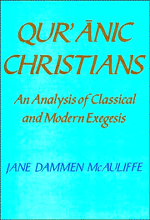Book contents
- Frontmatter
- Contents
- Acknowledgments
- Abbreviations
- Introduction
- PART I QURʾĀNIC COMMENTARY AND COMMENTATORS
- PART II QURʾĀNIC COMMENDATION OF CHRISTIANS
- 3 Nazarenes of faith and action
- 4 Followers of the Qurʾānic Jesus
- 5 Steadfast and submissive
- 6 The promised bounty of piety
- 7 The praiseworthy amity of Christians
- 8 Christians as pre-Qurʾānic Muslims
- 9 Compassion, mercy, and monasticism
- Conclusion
- Works cited
- Index of Qurʾānic verses
- Index of names and subjects
6 - The promised bounty of piety
Published online by Cambridge University Press: 24 February 2010
- Frontmatter
- Contents
- Acknowledgments
- Abbreviations
- Introduction
- PART I QURʾĀNIC COMMENTARY AND COMMENTATORS
- PART II QURʾĀNIC COMMENDATION OF CHRISTIANS
- 3 Nazarenes of faith and action
- 4 Followers of the Qurʾānic Jesus
- 5 Steadfast and submissive
- 6 The promised bounty of piety
- 7 The praiseworthy amity of Christians
- 8 Christians as pre-Qurʾānic Muslims
- 9 Compassion, mercy, and monasticism
- Conclusion
- Works cited
- Index of Qurʾānic verses
- Index of names and subjects
Summary
The fourth Qurʾānic text to be considered is associated with the Christians not by direct name, that is, by use of the term al-naṣārā, or by reference to the person of Jesus, or by general inclusion within the abl al-kitāb, but rather by designation of a specific scripture, the Gospel (injīl). Like the preceding verse, this one climaxes in a divine promise, a promise phrased in pungent, physical language. But unlike previous passages, this verse carries a striking grammatical structure. It is formed as a hypothetical sentence or, more precisely, as a conditional contrary to fact. As such it has posed particular problems for the exegetical tradition where the need for identification and specification is enhanced by the implied negativity. The pertinent text is from sūrat al-māʾidah (5):66:
If they had adhered to the Torah and the Gospel and what was sent down to them from their Lord, they would have eaten from above them and from beneath their feet. Among them is a balanced people but many of them are evildoers.
A SCRIPTURAL CONUNDRUM
An initial concern for virtually all of the commentators is the precise significance of the first verb in this verse. In his paraphrase of the opening lines al-Ṭabarī suggests a synonym that would permit the translation “if they had acted in accordance with (ʿamilū bi) the Torah and the Gospel.” Yet he is aware of the objection that could immediately be made against such an exhortation.
- Type
- Chapter
- Information
- Qur'anic ChristiansAn Analysis of Classical and Modern Exegesis, pp. 180 - 203Publisher: Cambridge University PressPrint publication year: 1991



